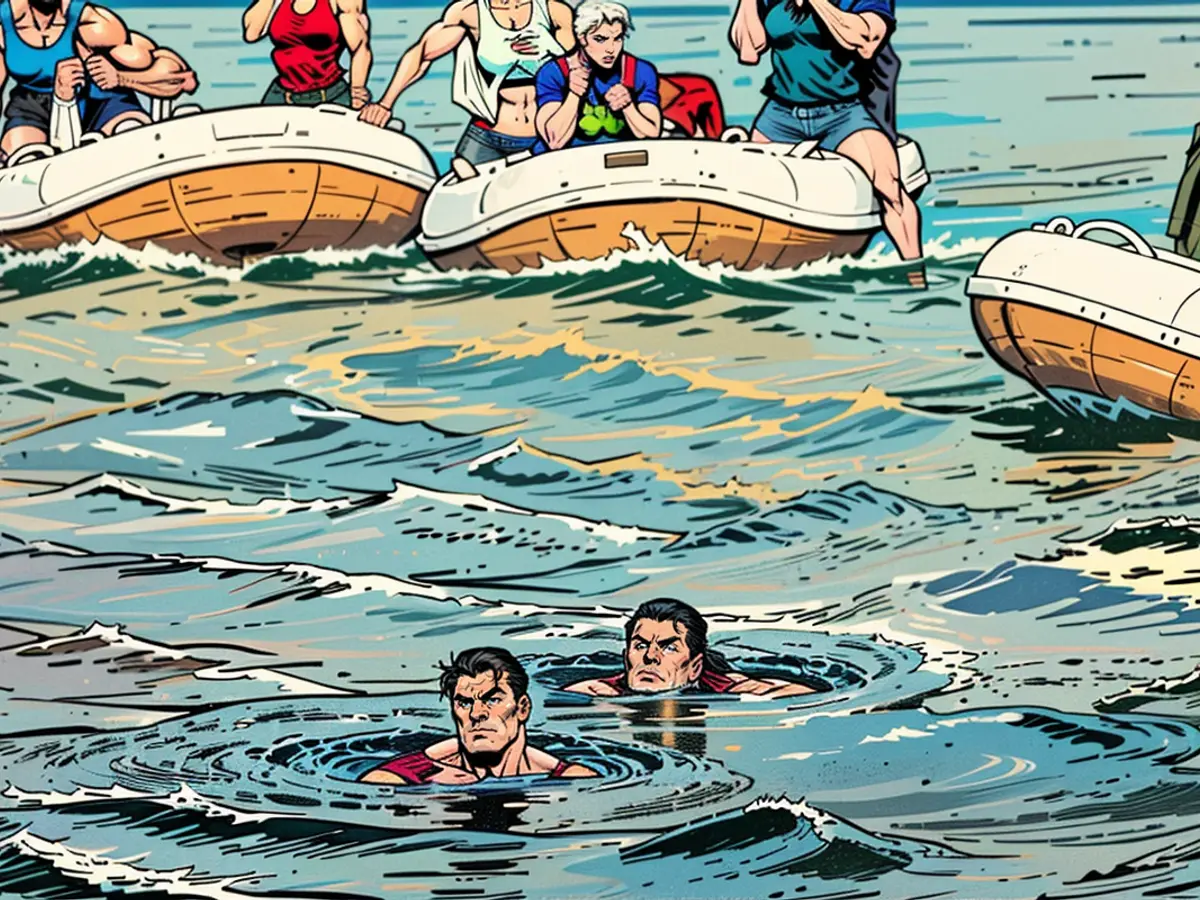The €1.4 billion problem of the dirty Seine
The Olympic Games in Paris also shine with their picturesque venues. One of them should be the Seine, which has been cleaned at great expense. But the river is causing problems, especially for the triathletes.
Two have already made it through. Feet first into the water and then back out again. Just weeks before the start of the Olympic Games in Paris, Mayor Anne Hidalgo and Olympic Organizing Chief Tony Estanguet dared to do it: Publicly, as politicians like to do, they swam in the Seine. Just to prove that, after 101 years of it being forbidden to swim in the polluted river, it is now safe to do so. "The water is gentle and doesn't taste like a sponge at all," Hidalgo said. It doesn't sound like a quality seal.
It would have fit with the other venues. Beach volleyball in the setting sun under the Eiffel Tower, fencing in the epic Grand Palais, and riding in front of the picturesque Château de Versailles: The Olympic Games in Paris offer some extravagant sports venues. And for the triathlon and open water swimming, it was supposed to be special: After a century, the Seine was supposed to be swum in again. But not only that: In that water, which has always been considered too dirty, the medal race was supposed to take place. A third of the triathlon was supposed to happen there, and the open water swimming was supposed to be completely there.
But the plan has a catch. The Seine is more than heavily polluted, with sewage flowing into it for centuries. The French state has spent more than 1.4 billion euros to prepare the river in time for the games. Households no longer dispose of their wastewater into the Seine or its tributaries. A huge overflow basin was supposed to prevent heavy rain from causing the sewage system to flood into the river. With limited success: It rained heavily again last weekend. The water still exceeds the limits for fecal bacteria.
This has consequences: The years of preparation by the athletes culminate in a game of chance. First, the training of the triathletes was canceled, then the competitions. They started preparing at 4 am, only to receive the cancellation half an hour later. The Seine is still too dirty to swim in. Lasse Luhrs, one of the German starters, told how he had already packed his bag and was having breakfast when he received the news. "In a way, the direct preparation was broken off," explains Martin Veith, sports director of the German Triathlon Union (DTU), in a phone interview with ntv.de.
And it remains uncertain: Tomorrow, Wednesday, the same preparation will begin again. Tomorrow, the women, including gold favorite Laura Lindemann, Lisa Tertsch, and others, will be up early, the men can sleep in a bit longer. According to their information, Veith says, certain bacteria limits have been exceeded. However, the trend is falling, and the water is expected to be fine tomorrow. It is supposed to rain again in the evening, but a little drizzle, a brief shower, is no problem, says Veith.
So far, it's still unclear. The national weather service Meteo France expects thunderstorms with prolonged rain in the evening, which could further deteriorate water quality. According to ntv.de meteorologist Carlo Pfaff, it will remain dry in the evening, and it's unlikely to rain for a long time at night. First thunderstorms are possible in the late second half of the night, according to some models, or on Wednesday morning, he says. Even if water quality improves, the weather might be unfavorable for swimming, maybe even the entire triathlon.
It's a test of patience for the athletes. "The mood is good," says Veith. The early cancellation was, of course, a bit of a dampener, but it was quickly processed. The triathletes had already prepared for this, they knew what they were getting into. "Every athlete is different," he says. For the Olympic competition, they accept the risk, trusting the World Triathlon to act in the best interest of the athletes. "If they let the athletes into the water, then the water quality will be acceptable enough to do a triathlon," says Veith. Anne Haug also confirms that it's no problem to jump into the Seine for the medal race. "On race day, you completely block out such thoughts and focus on your race," says the fastest Ironman athlete of all time, ntv.de.
There is a workaround
What exactly the problem is, Paris is keeping a small secret. It's about colibacteria and enterococci, reported the French magazine "We Demain" which specializes in ecological topics. It's an unappetizing story, as both types of bacteria can cause infections. This can be dangerous: athletes swallow water while swimming or have minor skin injuries through which pathogens could enter.
In triathlons, they are particularly sensitive to this. "The issue of water quality is unfortunately becoming more and more prominent," explains Ironman legend Haug. It started with the WTS race in Seoul, South Korea, many of whom suffered long-term consequences, she says. Even the wife of German triathlon legend Jan Frodeno. The Australian Emma Frodeno had to end her career due to water pollution at that very race. "That's what no one wishes for," her husband told SID. In the polluted water, she caught a parasite and had to fight with stomach problems afterwards, eventually having to end her career.
This should not happen again. The organizers of Paris have not come up with a real alternative to the Seine, which is a major point of criticism. Therefore, for now, there is only a workaround, as Veith describes it. The duathlon. Instead of swimming, the participants run twice and cycle. Haug speaks of the worst-case scenario, as it's simply a different sport. For women, it might not be a big problem, "as the big favorites for the medals are also the best runners. For men, it could be different, as the French men particularly have their strength in swimming, as the basis for their successes," says Haug.
Despite the efforts to clean the Seine, its water quality remains a concern for the triathletes competing in the Olympic Games in Paris. The high levels of fecal bacteria continue to exceed the acceptable limits, forcing organizers to cancel training sessions and potentially alter the triathlon events.
The organizers have proposed a workaround for the swimming portion of the triathlon, replacing it with a duathlon that includes running and cycling instead of swimming. This alternative is seen as a worst-case scenario for some athletes, particularly the male competitors who rely on their strong swimming skills for success.









